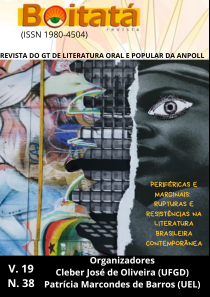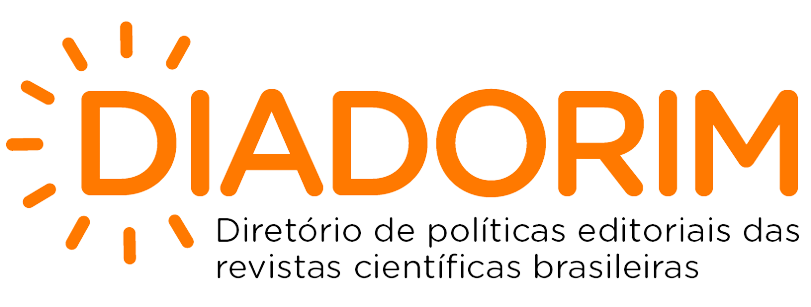Bahia on e periphery of e world: some reections about e editial market in Bahian
DOI:
https://doi.org/10.5433/boitata.2024v19.e49981Keywords:
Bahian publishing market, Independent publishers, Peripheral context productionsAbstract
At the same time, we are witnessing the intensification of cultural mobilizations in peripheral contexts, which are putting pressure on Brazilian literature to expand the established literary canon and driving the emergence of new publishing routes made up of independent publishers that bring to the attention of the reading public works produced by individuals who do not belong to the traditional publishing niche and disseminate writing produced in other locations that are not part of the national book circuit: Rio/São Paulo. This article, through a literature review, seeks to analyze the spaces of socioeconomic power and editorial visibility provided to contemporary productions from peripheral contexts by publishers considered independent and expose the difficulties faced by these institutions to remain in operation in the Bahian publishing market, to this end it dialogues with Cosson (2018), Dalcastagnè, (2012), Dantas (2022), Fonseca (2019), Garramuño (2014), Junior; Santos (2009), Lima et al. (2022), Oliveira (2011), Porto (2012), Seidel et al. (2016), Silva (2019). The results show that although the publishing market in Bahia is experiencing difficulties, institutions such as Reaja, Ogum's and Organismo highlight the potential of diversity, as well as the existence of other ways of producing and disseminating for more plural and democratic audiences.
Downloads
References
COSSON, R. Letramento literário: teoria e prática. 2. ed. São Paulo: Contexto, 2018.
DALCASTAGNÈ, R. Literatura brasileira contemporânea: um território contestado. Vinhedo: Editora Belo Horizonte, 2012.
DANTAS, C. C. Editar na Bahia: dinâmicas da cadeia produtiva do livro em um mercado regional. 2022. Dissertação (Mestrado em Cultura e Sociedade) - Instituto de Humanidades, Universidade Federal da Bahia, Salvador, 2022. Disponível em: https://repositorio.ufba.br/handle/ri/35395. Acesso em: 18 out. 2021.
EDITORA OGUM'S. Somos Ogum's. [Salvador]: Editora Ogum's, [2021]. Disponível em: https://editoraogums.com/somos-ogums/. Acesso em: 11 out. 2021.
FONSECA, S. C. da. Inscrições periféricas na poética contemporânea. In: AUGUSTO, J. (org.). Contemporaneidades periféricas. Salvador: Segundo Selo, 2019. p. 251-270.
GARRAMUÑO, F. Formas da impertinência. In: KIFFER, A.; GARRAMUÑO, F. (org.). Expansões contemporâneas: leitura e outras formas. Belo Horizonte: Editora da UFMG, 2014. p. 91-108.
LIMA, L. de O. A.; COUTINHO, I.; GONÇALVES, L.; SILVA, A. Retratos da literatura baiana contemporânea (2000-2014). Salvador: EDUFBA, 2022.
LOPES JUNIOR, W. M.; SANTOS, R. C. B. dos. Novas centralidades na perspectiva da relação centro-periferia. Sociedade & Natureza, Uberlândia, v. 21, n. 3, p. 351-359, dez. 2009. DOI: https://doi.org/10.1590/S1982-45132009000300010.
MERCADO editorial baiano cresce, mas há entraves a contornar. A Tarde, Salvador, 28 ago. 2011. Disponível em: https://atarde.com.br/cultura/mercado-editorial-baiano-cresce-mas-ha-entraves-a-contornar-109313. Acesso em: 11 out. 2021.
MESA 2 a resistência do mercado editorial baiano. [S. l.: s. n.], 2021. 1 vídeo (1h 11 min.). Publicado pelo canal Contemporâneos - Grupo de Pesquisa. Disponível em: https://www.youtube.com/watch?v=-3eE77UNxvc. Acesso em: 11 out. 2021.
OGUM's toques negros. Literafro, Belo Horizonte, 7 jun. 2023. Disponível em: http://www.letras.ufmg.br/literafro/editoras/1377-ogum-s-toques-negros. Acesso em: 7 ago. 2023.
OLIVEIRA, G. "É o processo de evolução do mercado editorial", diz pesquisadora sobre fechamento de livrarias". Metro 1, Salvador, 6 jul. 2021. Disponível em: https://www.metro1.com.br/noticias/cultura/108897,e-o-processo-de-evolucao-do-mercado-editorial-diz-pesquisadora-sobre-fechamento-de-livrarias. Acesso em: 11 out. 2021.
OLIVEIRA, R. P. de. Literatura marginal: questionamentos à teoria literária. Ipotesi, Juiz de Fora, v. 15, n. 2, jul./dez. 2011. Disponível em: https://pt.scribd.com/document/205165649/Oliveira-Rejane-Literatura-Marginal-Questionamentos-a-Teoria-Literaria-pdf. Acesso em: 11 out. 2021.
PORTO, G. P. Poéticas periféricas: outras centralidades?. Ide, São Paulo, v. 34, n. 53, p. 57-68, jan. 2011. Disponível em: http://pepsic.bvsalud.org/scielo.php?script=sci_arttext&pid=S0101-31062011000200007&lng=pt&nrm=iso&tlng=pt. Acesso em: 11 out. 2021.
SEGUNDO SELO. História. Salvador: Segundo Selo, [2021]. Disponível em: http://editorasegundoselo.com.br/historia/. Acesso em: 11 out. 2021.
SEIDEL, R. H.; GALVÃO, R. M.; OLIVEIRA, C. da M. Econocriativa: mapeamento e diagnóstico das editoras baianas. Feira de Santana: Editora da UEFS, 2016.
SILVA, J. A. Contemporaneidades periféricas: primeiras anotações para alguns estudos de caso. In: AUGUSTO, J. (org.). Contemporaneidades periféricas. Salvador: Segundo Selo, 2019. p. 31-68.
SOLUÇÃO para mercado editorial baiano pode sair das universidades. A Tarde, Salvador, 28 out. 2007. Disponível em: https://atarde.com.br/bahia/bahiasalvador/solucao-para-mercado-editorial-baiano-pode-sair-das-universidades-299452. Acesso em: 11 out. 2021.
Downloads
Published
How to Cite
Issue
Section
License
Copyright (c) 1969 Emanuelle Evangelista, Luciana Moreno

This work is licensed under a Creative Commons Attribution 4.0 International License.
Boitatá esta licenciada com CC BY sob essa licença é possível: Compartilhar - copiar e redistribuir o material em qualquer suporte ou formato. Adaptar - remixar, transformar, e criar a partir do material, atribuindo o devido crédito e prover um link para a licença e indicar se mudanças foram feitas.






















